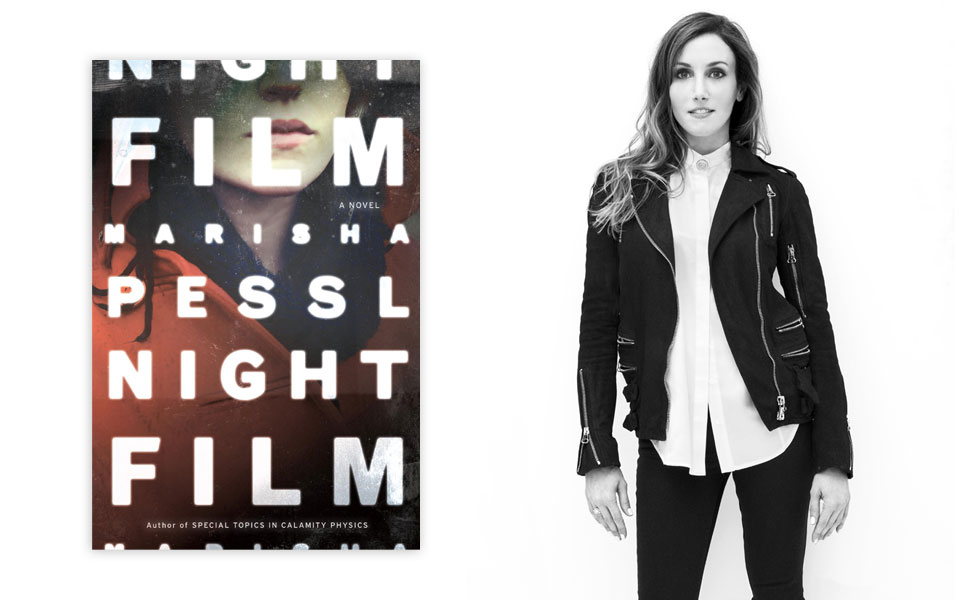
Seven years after her first book, Marisha Pessl is back with Night Film, a riveting, labyrinthine thriller about a reclusive filmmaker, Stanley Cordova, and the mysterious death of his piano-prodigy daughter.
What inspired Night Film?
I was struck by the idea of the auteur and what it means for actors or people from different walks of life to make a film under the direction of a central figure, so I added a magical layer in terms of this larger-than-life underground figure that became Cordova.
Was David Lynch an inspiration?
He was, along with Stanley Kubrick and Roman Polanski. I did a lot of research on all the different auteurs that have existed…since Charlie Chaplin, really. So Cordova comes out of that, but there wasn’t one central inspiration.
This is your second murder mystery — what drives your fascination with the genre?
I love any voyage toward the truth, and the conceit of a mystery makes that quite easy in terms of people trying to get to the bottom of something. I think all my books in some way will be mysteries, because people are always fumbling for some kind of truth that they’re trying to wrestle to the ground.
Seven years between your books — was this a hard one to write?
It was. I think the wonderful thing about it for me was that I didn’t try to create something in a given period of time. I let it organically come into being. It definitely took me a long time to build the world of Cordova and his entire subculture — his body of work and these terrifying films that he crafted. And then in terms of writing it, it took a lot of time for me to figure out the way into the novel, what the core story was — which is all the secrets surrounding this family, the Cordovas.
Was this the first idea you had after your first book?
Oh, no. Definitely not. Originally I think I was going to write about a painter and I had the idea of writing an epistolary novel, so it would be all letters, but I didn’t want to be constrained, so I abandoned that. I probably had at least three other ideas before I came to this world of Cordova. You really have to find the core idea that is infinitely fascinating to you — so enigmatic and mysterious that you really want to look at from all sides, because otherwise you’ll never make it through the writing of a novel.
Do any of the characters take after people in your life? Or you?
Nora definitely reminds me of myself when I first came to New York City. I wasn’t as adrift as she was, but I did a lot of off-off-Broadway theater. I just remember all these really vibrant characters that I came into contact with through the theater world; I remember being in a play with someone who actually lived at a club — he would go from nightclub to nightclub and would sleep overnight because he was homeless. So Nora really came into being from some of those types that I met. And Hopper, too — the idea of this drifter, someone on the periphery of society.
Since the book revolves around a cult horror film director, what are your favorite scary movies?
I actually love a lot of early Polanski, like Knife in the Water…and Rosemary’s Baby, obviously. I don’t like flat-out horror movies; I really prefer the psychological thriller. What I find scary is what isn’t seen — what you conjure in your mind is the most terrifying thing of all.
Who are your literary influences?
When I was writing Night Film, I loved Truman Capote. Not just In Cold Blood but some of his short stories, his letters, Breakfast at Tiffany’s and even his interviews. He would paint such a vibrant picture in a few sentences, and yet he also had such a sense of plot and drama. In terms of mysteries, I absolutely love Raymond Chandler and Agatha Christie. In college I read a lot of Nabokov — the idea of a puzzle and a labyrinth the writer creates to try and keep readers on the edge of their seats…I really like that as well.
Where and how do you write best?
I have an office in my apartment, I write maybe 50 percent of the time there. But I also travel a lot. I love to write in cafés or any hole in the wall — if it’s loud, fantastic and if there are fascinating people and conversations, they’ll inevitably make their way into the novel in some way.
Best writing advice you’ve ever received?
E.L. Doctorow told me to never read reviews or have somebody read them and, if there’s something insightful that can be of use to you as a writer and the creative process, then they can flag it and have you read it. And then he basically said that it never gets easier; every time you release a novel, it’s putting yourself out there and taking risks. It’s inviting people to comment whether it’s good or bad, and that’s the nature of job and that’s the nature of art, so you have to embrace that process.
The one book you’d take with you to a deserted island?
The Little Prince. That would be all I need.
